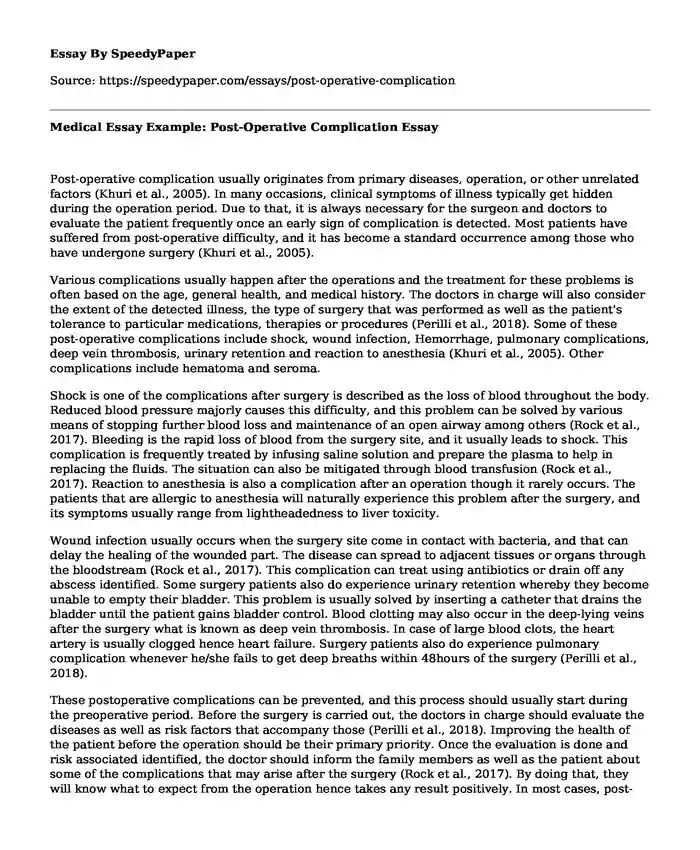Post-operative complication usually originates from primary diseases, operation, or other unrelated factors (Khuri et al., 2005). In many occasions, clinical symptoms of illness typically get hidden during the operation period. Due to that, it is always necessary for the surgeon and doctors to evaluate the patient frequently once an early sign of complication is detected. Most patients have suffered from post-operative difficulty, and it has become a standard occurrence among those who have undergone surgery (Khuri et al., 2005).
Various complications usually happen after the operations and the treatment for these problems is often based on the age, general health, and medical history. The doctors in charge will also consider the extent of the detected illness, the type of surgery that was performed as well as the patient's tolerance to particular medications, therapies or procedures (Perilli et al., 2018). Some of these post-operative complications include shock, wound infection, Hemorrhage, pulmonary complications, deep vein thrombosis, urinary retention and reaction to anesthesia (Khuri et al., 2005). Other complications include hematoma and seroma.
Shock is one of the complications after surgery is described as the loss of blood throughout the body. Reduced blood pressure majorly causes this difficulty, and this problem can be solved by various means of stopping further blood loss and maintenance of an open airway among others (Rock et al., 2017). Bleeding is the rapid loss of blood from the surgery site, and it usually leads to shock. This complication is frequently treated by infusing saline solution and prepare the plasma to help in replacing the fluids. The situation can also be mitigated through blood transfusion (Rock et al., 2017). Reaction to anesthesia is also a complication after an operation though it rarely occurs. The patients that are allergic to anesthesia will naturally experience this problem after the surgery, and its symptoms usually range from lightheadedness to liver toxicity.
Wound infection usually occurs when the surgery site come in contact with bacteria, and that can delay the healing of the wounded part. The disease can spread to adjacent tissues or organs through the bloodstream (Rock et al., 2017). This complication can treat using antibiotics or drain off any abscess identified. Some surgery patients also do experience urinary retention whereby they become unable to empty their bladder. This problem is usually solved by inserting a catheter that drains the bladder until the patient gains bladder control. Blood clotting may also occur in the deep-lying veins after the surgery what is known as deep vein thrombosis. In case of large blood clots, the heart artery is usually clogged hence heart failure. Surgery patients also do experience pulmonary complication whenever he/she fails to get deep breaths within 48hours of the surgery (Perilli et al., 2018).
These postoperative complications can be prevented, and this process should usually start during the preoperative period. Before the surgery is carried out, the doctors in charge should evaluate the diseases as well as risk factors that accompany those (Perilli et al., 2018). Improving the health of the patient before the operation should be their primary priority. Once the evaluation is done and risk associated identified, the doctor should inform the family members as well as the patient about some of the complications that may arise after the surgery (Rock et al., 2017). By doing that, they will know what to expect from the operation hence takes any result positively. In most cases, post-operative complications do come as a shock to many therefore the victims, and their families need mental preparedness before it happens.
References
Khuri, S. F., Henderson, W. G., DePalma, R. G., Mosca, C., Healey, N. A., & Kumbhani, D. J. (2005). Determinants of long-term survival after major surgery and the adverse effect of postoperative complications. Annals of surgery, 242(3), 326.
Perilli, V., Aceto, P., Ancona, P., De Cicco, R., Papanice, D., Magalini, S. ... & Sollazzi, L. (2018). Role of surgical setting and patients-related factors in predicting the occurrence of postoperative pulmonary complications after abdominal surgery. Eur Rev Med Pharmacol Sci, 22(2), 547-550.
Rock, A. K., Opalak, C. F., Workman, K., Carr, M., & Broaddus, W. C. (2017). 159 Factors Associated with Postoperative Complications Following Transsphenoidal Surgery for Pituitary Tumor resection from the national Surgical Quality Improvement Program (NSQIP). Neurosurgery, 64(CN_suppl_1), 239-240.
Cite this page
Medical Essay Example: Post-Operative Complication. (2022, Mar 08). Retrieved from https://speedypaper.net/essays/post-operative-complication
Request Removal
If you are the original author of this essay and no longer wish to have it published on the SpeedyPaper website, please click below to request its removal:
- The Lottery - A Literary Essay Example
- Free Essay Sample about Democratization of Germany
- Project Management Essay: Crisis at the Jobsite Analysis
- Free Essay on Whether Flexible Working Hours Foster Teamwork
- Essay Sample for Everyone: Foreign Direct Investment in the UK
- Supply Chain Logistics Management Case Study
- Essay Sample on Level of Regulatory Authority Scope Role within U.S. Healthcare System
Popular categories





